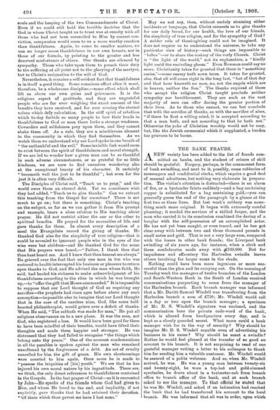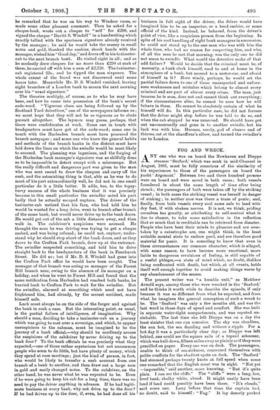THE BANK FRAUDS.
ANEW variety has been added to the list of frauds com- mitted on banks, and the student of crimes of skill should be grateful. Forgery, perhaps, is the commonest form of bank swindling, and next to it, possibly, come robberies of messengers and confidential clerks, which require a good deal of manual adroitness, but nothing very elaborate in prepara- tion. The victim's attention is distracted—there is an alarm of fire, or a bystander faints suddenly—and a bag containing copper is substituted for a bag containing gold,—you can generally guess the end of the paragraph by a glance at the first two or three lines. But last week's robbery was some- thing much more original. It began with extremely careful planning; it needed the services of a skilled forger, and the man who carried it to its conclusion combined the daring of a burglar with the self-possession of an accomplished actor. He has not yet been caught, or even traced, and he has got clear away with between two and three thousand pounds in small notes and gold. That is not a very large sum, compared with the losses in other bank frauds; the Liverpool bank swindling of six years ago, for instance, when a clerk and three confederates made away with *C160,000. But for impudence and effrontery the Harlesden swindle leaves others involving far larger sums in the shade.
Nothing could have been more ingenious or more suc- cessful than the plan and its carrying out. On the morning of Tuesday week the managers of twelve branches of the London and South-Western Bank in the South of London received communications purporting to come from the manager of the Harlesden branch. Each branch manager was informed that a Mr. Devitt Samuel Windell was transferring from the Harlesden branch a sum of £750; Mr. Windell would call in a day or two upon the branch manager ; a specimen of Mr. D. S. Windell's signature was enclosed, and the communication bore the private code-word of the bank, which is altered from headquarters every day, and is kept as a closely guarded secret. What more could a bank manager wish for in the way of security ? Why should he imagine Mr. D. S. Windell capable even of advertising his business in his name ? Why should he scent a swindle ? Rather he would feel pleased at the transfer of so good an account to his branch. It is not surprising to read of one grateful manager writing a letter to his colleague to thank him for sending him a valuable customer. Mr. Windell would be assured of a polite welcome. And so, when Mr. Windell arrived, he was. He was a young man between twenty-six and twenty-eight, he wore a top-hat and gold-rimmed spectacles, be drove about in a taximeter-cab from branch office to branch office of the bank, and at each branch asked to see the manager. To that official he stated that he was Mr. Windell, and asked if an intimation had reached the bank that he had transferwid his account to the local branch. He was informed that all was in order; upon wbidh
he remarked that he was on his way to Windsor races, or made some other pleasant comment. Then he asked for a cheque-book, wrote out a cheque to "self" for £290, and signed the cheque " Davitt S. Windell" in a handwriting which exactly tallied with the specimen signature already received by the manager ; be said he would take the money in small notes and gold, thanked the cashier, shook hands with the manager, wished him "Good day," and drove off in his taximeter- cab to the next branch bank. He visited eight in all; and as he modestly drew cheques for no more than £290 at each of them, he carried off with him a sum of £2,320. The taximeter- cab registered 22s., and be tipped the man sixpence. The whole extent of the fraud was not discovered until some hours later. Meanwhile Mr. D. S. Windell vanished, leaving eight branches of a London bank to mourn the next morning over his " usual signature."
The theories multiply, of course, as to who he may have been, and bow he came into possession of the bank's secret code-word. " Vigorous clues are being followed up by the Scotland Yard detectives," one of the newspapers informs us ; we must hope that they will not be so vigorous as to elude pursuit altogether. The layman may guess, perhaps, that there were confederates at work. Some one in touch with headquarters must have got at the code-word; some one in touch with the Harlesden branch must have procured the branch notepaper ; and some one who knew the general habits and methods of the branch banks in the district must have laid down the lines on which the swindle would be most likely to succeed. The planning was ingenious, and the forging of the Harlesden bank manager's signature was so skilfully done as to be impossible to detect except with a microscope. But the really difficult and dangerous part was given to the man who was sent round to draw the cheques and carry off the cash, and the astonishing thing is that, able as he was to do most of his part extraordinarily well, he did not in one small particular do it a little better. It adds, too, to the topsy- turvy success of the whole business that it was precisely because in this small particular the swindler acted his part badly that he actually escaped capture. The driver of the taximeter-cab noticed that his fare, who had told him he would be wanted for a long drive, went to branch after branch of the same bank, but would never drive np to the bank doors. He would get out of the cab a little distance away, and then walk in. The cabdriver's suspicions were aroused. He thought the man he was driving was trying to get a cheque cashed, and was being refused ; he could not, anyhow, under- . stand why he should stop short of the bank doors, and as they drove to the Crofton Park branch, drew up at the entrance. The swindler suspected something, and told him to drive straight back to the headquarters of the bank in Fenchurch Street. He did so ; but if Mr. D. S. Windell had gone into the Craton Park office he would have been caught. The manager of that branch was acting as manager of the Forest Hill branch near, owing to the absence of its manager on a holiday, and when he went to Forest. Hill and found that the same notification from Harlesden had reached both banks, he hurried back to Crofton Park to wait for the swindler. But the swindler, alarmed at something which need not have frightened him, had already, by the merest accident, made himself safe.
Luck must always be on the aide of the forger and against the bank in such a case. But the interesting point, as usual, is the partial failure of intelligence, of imagination. Why should a man, deciding to take a taximeter-cab on a journey which was going to cost over a sovereign, and which, to appear unsuspicious to the cabman, must be imagined to be the journey of a bank official,—why should he needlessly arouse the suspicions of the cabdriver by never driving up to the bank door? To the bank officials he was precisely what they expected,—one of those rather mysterious but not uncommon people who seem to do little, but have plenty of money, which they spend at race meetings ; just the kind of person, in fact, who would be likely to transfer a cash account from one branch of a bank to another, and then draw out a large sum in gold ,and easily changed notes. To the cabdriver, on the other hand, he was never what he was expected to be. Even if he were going to keep his cab for a long time, there was no need to pay the driver anything in advance. If he had legiti- mate business at every bank, why not drive up to the door? xf he had driven up to the door, if, even, he had done all his
business in full sight of the driver, the driver would have imagined him to be an inspector, or a bead cashier, or some official of the kind. Instead, he behaved, from the driver's point of view, like a suspicious person from the beginning. In spite of his cool handling of eight bank managers in succession, he could not stand up to the one man who was with him the whole time, who bad no reason for suspecting him, and who, of all the men he met that morning, was the only one be did not mean to swindle. What would the detective make of that odd failure ? Would be decide that the criminal must be, of necessity, a bank clerk himself, used to and at home in the atmosphere of a bank, but unused to a motor-car, and afraid of himself in it ? More wisely, perhaps, he would set the partial failure down to one of those unsuspected and unfore- seen weaknesses and mistakes which belong to almost every criminal and are part of almost every crime. The man, just because he is man, does not and cannot think out everything ; if the circumstances alter, he cannot be sure how he will behave in them. He cannot be absolutely certain of what he himself will do. In this particular case, he did not foresee that the driver might stop before he was told to do so, and when the cab stopped he was unnerved. He should have got out unconcernedly and gone in to another swindle, but his luck was with him. Hermes, surely, god of chance and of thieves, sat at the chauffeur's elbow, and turned the swindler's car to London.

























































 Previous page
Previous page